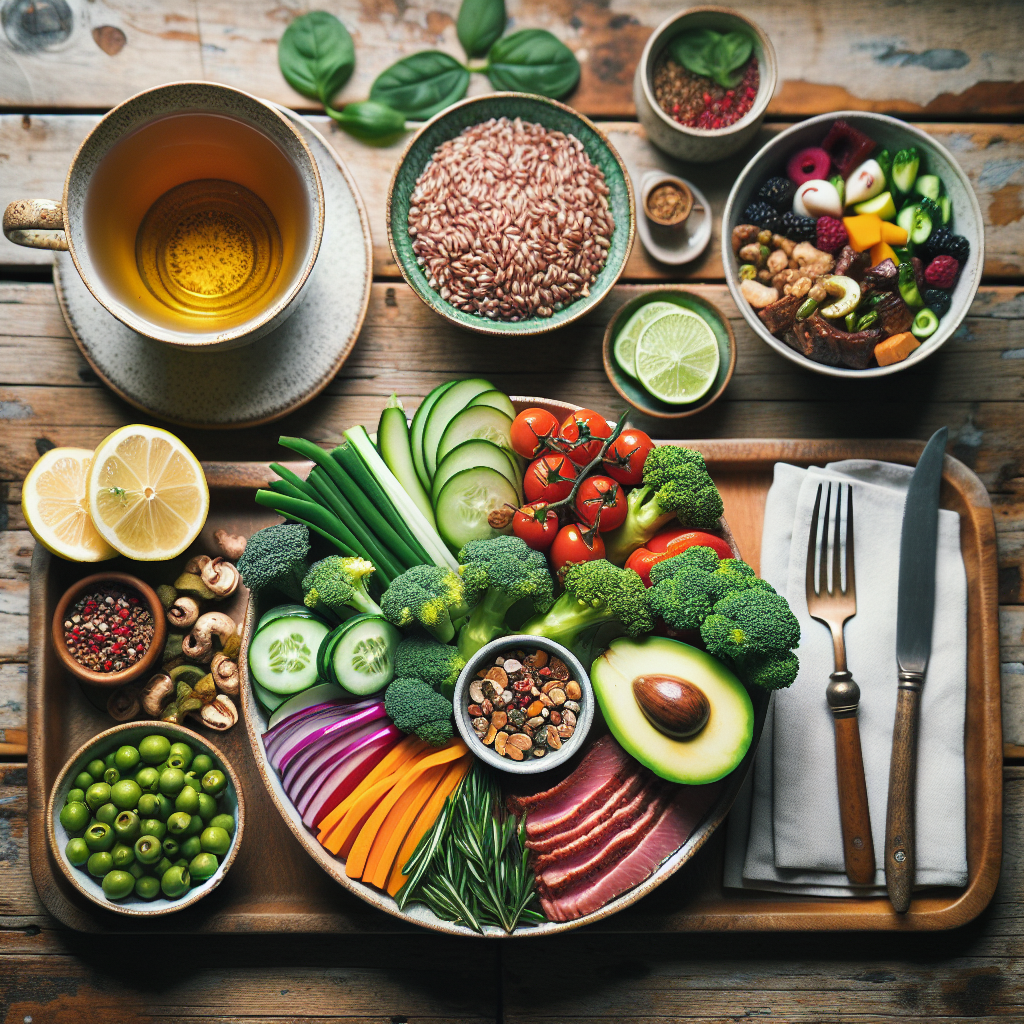Have you ever stopped to think that the most powerful pharmacy you’ll ever visit isn’t down the street—it’s right in your own kitchen? This isn’t some trendy wellness catchphrase. It’s ancient wisdom that’s been guiding human health for thousands of years, and modern science is finally catching up to prove it.
The concept of “food as medicine” isn’t new at all. In fact, it’s older than most countries on this planet. Traditional Chinese Medicine (TCM) and Ayurveda, the ancient healing system of India, have been treating food as the foundation of health for over 2,000 years. These time-honored traditions don’t just focus on fixing what’s broken—they emphasize something far more profound: balance, harmony, and prevention.
In TCM, practitioners have long understood that different foods carry specific energies that directly influence our organs and bodily systems. A warming ginger root isn’t just a flavor enhancer—it’s a tool to dispel cold and dampness from the body, supporting digestive fire and circulation. Cool cucumber isn’t merely refreshing on a hot day—it clears heat and supports hydration at a deeper level. Every ingredient has a purpose, a personality, and a healing potential.
Ayurveda takes a similar approach, viewing food through the lens of individual constitution, or “dosha.” What nourishes one person might imbalance another. A fiery Pitta constitution might need cooling foods like coconut and cilantro, while a Vata type thrives on warm, grounding meals with healthy fats. The wisdom here? There’s no universal “perfect diet”—only the perfect diet for you, right now, in this season, with your unique body.
These ancient systems recognized something revolutionary: that diet profoundly impacts not just physical health, but emotional wellbeing, mental clarity, and spiritual vitality. They understood the mind-body connection centuries before Western medicine acknowledged it. And most importantly, they saw the kitchen as the first line of defense against illness, not the last resort after medications fail.
What Modern Science Says About Your Healing Kitchen
Fast forward to today, and cutting-edge nutritional research is validating what traditional healers have known all along. The scientific evidence is overwhelming: specific foods don’t just provide calories and nutrients—they actively communicate with our cells, influence our genes, and orchestrate healing responses throughout the body.
Let’s talk about inflammation first. Chronic inflammation is the silent troublemaker behind most modern diseases—heart disease, diabetes, arthritis, autoimmune conditions, and even Alzheimer’s. But here’s the exciting part: what you eat can either fan the flames or put out the fire. Studies show that diets rich in colorful vegetables, omega-3 fatty acids from fish and flaxseeds, and anti-inflammatory spices like turmeric can dramatically reduce inflammatory markers in the body. In one Yale trial, participants who reduced their added sugar intake saw significant drops in C-reactive protein (CRP), a key inflammation marker.
Blood sugar regulation is another arena where your kitchen truly shines. The standard American diet—loaded with refined sugars and processed carbohydrates—creates a metabolic rollercoaster that exhausts your body’s insulin response. Over time, this leads to insulin resistance, weight gain, and type 2 diabetes. But research demonstrates that fiber-rich whole grains, healthy fats, and protein-balanced meals can stabilize blood sugar levels, improve insulin sensitivity, and even reverse prediabetes in many cases. Foods like cinnamon, bitter melon, and fenugreek have been shown to support healthy glucose metabolism—knowledge that TCM practitioners have applied for centuries.
Your immune system, that incredible defense network protecting you from illness, is also profoundly influenced by what’s on your plate. About 70% of your immune system lives in your gut, and what you feed it matters enormously. Fermented foods like kimchi, sauerkraut, and miso introduce beneficial bacteria that strengthen your gut barrier and train immune cells. Garlic contains allicin, a compound with antimicrobial properties. Mushrooms like shiitake and reishi contain beta-glucans that enhance immune cell activity. Citrus fruits, rich in vitamin C, support white blood cell production.
Recent research reveals something even more fascinating: excess blood sugar can actually “react with” immune system proteins, disrupting their function and promoting inflammation. High sugar intake increases intestinal permeability (what some call “leaky gut”), creates oxidative stress, and promotes the growth of pro-inflammatory bacteria while starving beneficial microbes. This cascade effect shows how deeply interconnected our diet, gut health, and immune function truly are.
The science is clear: food isn’t just fuel. It’s information, signaling molecules that tell your body how to function, what to build, and how to heal.
Your Body’s Unique Blueprint: The Power of Personalized Nutrition
Now here’s where ancient wisdom and modern innovation create something truly transformative. Both traditional systems like TCM and Ayurveda, and cutting-edge personalized nutrition approaches, recognize a fundamental truth: you are biochemically unique.
Traditional Chinese Medicine has always emphasized individual assessment. Two people with the same Western diagnosis—let’s say chronic fatigue—might receive completely different dietary recommendations based on their tongue coating, pulse quality, and constitutional patterns. One person’s fatigue might stem from Qi deficiency requiring warming, energy-building foods, while another’s could be from Blood stagnation needing circulation-promoting ingredients.
Modern personalized nutrition takes a parallel path using different tools. Advanced approaches now integrate genetic profiles, metabolic markers, gut microbiome composition, and lifestyle factors to create tailored dietary guidance. Nutritional genomics investigates how your genetic variations influence how you respond to specific nutrients. Some people efficiently process caffeine while others metabolize it slowly, affecting everything from sleep to anxiety levels. Some individuals need more folate or vitamin D based on genetic variants.
The exciting convergence happens when we merge these approaches. At HerbalsZen, we believe the most powerful personalized nutrition strategy combines the pattern-recognition wisdom of Eastern medicine with the precision of modern technology. Our EastChi AI platform does exactly this—analyzing your unique body constitution through traditional assessment methods while incorporating contemporary nutritional science to deliver truly personalized recommendations.
This isn’t about choosing between ancient wisdom and modern science. It’s about recognizing they’re two languages describing the same truth: optimal health requires understanding your individual needs and meeting them precisely. A one-size-fits-all diet will never work because we don’t have one-size-fits-all bodies.
From Sick Care to Self Care: A Revolutionary Shift
Let’s talk about something that might change your entire perspective on health: the difference between “sick care” and “health care.”
Most of what we call healthcare is actually sick care—waiting until something breaks, then trying to fix it with medications and procedures. It’s reactive, expensive, and often addresses symptoms rather than root causes. Don’t get me wrong—modern medicine saves lives, and we need it. But it’s only part of the picture.
True health care is proactive. It’s about building vitality, maintaining balance, and preventing disease before it takes root. And this is where food as medicine becomes revolutionary.
Think about it this way: taking medication after developing type 2 diabetes manages the condition, but eating a balanced, whole-foods diet rich in fiber and healthy fats could have prevented it entirely. Using painkillers for chronic inflammation provides temporary relief, but removing inflammatory foods and adding anti-inflammatory ingredients addresses the underlying issue. Antacids treat acid reflux symptoms, but identifying trigger foods and supporting digestive function through dietary changes can resolve the problem at its source.
This shift from reactive to proactive health management empowers you in ways medication never can. When you understand that your daily food choices are either building health or stealing it, every meal becomes an opportunity to invest in your future wellbeing. You’re no longer a passive patient waiting for a diagnosis—you’re an active participant in your own vitality.
Traditional Chinese Medicine has always operated from this prevention-first mindset. Ancient TCM texts emphasize that superior physicians prevent illness before it appears, while inferior ones treat it after it manifests. The goal was never just treating disease—it was maintaining harmony so disease couldn’t take hold.
HerbalsZen embraces this same philosophy, enhanced by AI technology that makes ancient prevention wisdom accessible in modern life. By helping you understand your unique body constitution and providing personalized guidance aligned with your specific needs, we’re supporting your journey from sick care dependency to self-care empowerment. We’re not replacing your doctor—we’re helping you become the expert on your own body so you need the doctor less often.
This approach offers what researchers call a “powerful trifecta“: significant cost savings compared to medication management, improved health outcomes, and enhanced quality of life. Lifestyle-first strategies aren’t just effective—they’re sustainable, side-effect-free, and they actually get at root causes rather than masking symptoms.
Putting Food Medicine Into Practice: Real Tools for Real Life
All this wisdom means nothing if you can’t apply it in your actual kitchen, right? Let’s get practical.
Consider Maria, a 42-year-old teacher who came to HerbalsZen struggling with chronic digestive issues, low energy, and poor sleep. She’d tried various diets—keto, paleo, vegan—but nothing stuck or truly helped. Through constitutional assessment, we identified that her pattern aligned with Spleen Qi deficiency in TCM terms, with symptoms of dampness accumulation.
Her personalized food-as-medicine approach wasn’t complicated or extreme. We recommended warm, cooked meals over raw foods (which are harder to digest when digestive fire is weak). We added digestive-supporting spices like ginger, fennel, and cardamom. We increased protein and decreased refined carbohydrates to stabilize blood sugar. We eliminated dairy temporarily, as it contributes to dampness in TCM. Within six weeks, her digestion improved dramatically, her energy stabilized, and she was sleeping through the night for the first time in years.
Then there’s James, dealing with chronic inflammation and joint pain. His constitution showed signs of what TCM calls “heat” and excess Yang. His food medicine protocol emphasized cooling, anti-inflammatory foods: fatty fish three times weekly for omega-3s, turmeric golden milk in the evening, abundant leafy greens and berries, and elimination of sugar and processed foods that were fueling his inflammation. He incorporated bone broth to support joint health. Within three months, his inflammatory markers dropped significantly, and his joint pain decreased by about 70%.
These aren’t unusual cases—they’re examples of what happens when you align your diet with your body’s actual needs rather than following generic advice.
So how do you start your own food-as-medicine practice? Here are some practical tools:
Start with awareness. Keep a food and symptom journal for two weeks. Notice how different foods make you feel—energy levels, digestion, mood, sleep quality. Your body is constantly sending signals; most of us just aren’t listening.
Embrace whole foods. This is the foundation. Processed foods are nutritionally bankrupt and often inflammatory. Build your meals around vegetables, quality proteins, healthy fats, and complex carbohydrates. Shop the perimeter of the grocery store where the real food lives.
Add healing spices. Transform ordinary meals into medicine by incorporating anti-inflammatory, digestive-supporting spices. Turmeric, ginger, garlic, cinnamon, cumin, and coriander aren’t just flavor—they’re functional ingredients with real healing properties.
Eat with the seasons. Traditional systems emphasize seasonal eating because it aligns your body with natural rhythms. Summer calls for cooling foods like cucumber and watermelon. Winter needs warming soups and roasted root vegetables. Your body’s needs change with seasons—your diet should too.
Personalize your approach. Generic dietary advice fails because it ignores individual differences. Consider working with a platform like HerbalsZen’s EastChi AI to understand your unique constitution and get tailored recommendations that actually match your body’s needs.
Focus on gut health. Your gut microbiome influences everything from immunity to mood. Include fermented foods, prebiotic fibers, and probiotic-rich ingredients. Avoid excessive sugar and processed foods that feed harmful bacteria.
Make gradual changes. Don’t overhaul everything overnight. Add one healing food this week. Remove one inflammatory food next week. Sustainable change happens incrementally, not through dramatic extremes that you can’t maintain.
The Synergy of Ancient Wisdom and Modern Innovation
We stand at an extraordinary moment in human history. For the first time ever, we can combine thousands of years of traditional healing wisdom with cutting-edge technology and modern scientific understanding. This isn’t just additive—it’s exponential.
Traditional Chinese Medicine offers profound insights into body patterns, constitutional types, and the energetic properties of foods that modern science is only beginning to measure and validate. Modern nutritional science provides detailed understanding of biochemistry, nutrient interactions, and disease mechanisms that traditional systems couldn’t articulate. Artificial intelligence can now process both knowledge streams simultaneously, analyzing your unique situation through multiple lenses to deliver truly personalized, actionable guidance.
This is exactly what HerbalsZen was built to do. We honor the depth of TCM wisdom—the Five Elements theory, Yin-Yang balance, Qi energy patterns, and the understanding that food is medicine. We enhance it with modern nutritional science, validated through both traditional texts and contemporary research. And we make it accessible through AI technology that can deliver personalized recommendations at scale, helping individuals worldwide access wisdom that was once available only to those who could study for decades or afford personal practitioners.
Your kitchen truly does hold more healing power than your medicine cabinet—but only if you know how to unlock it. That requires understanding both your body’s unique needs and which foods can meet those needs. It requires moving beyond one-size-fits-all diets toward truly personalized nutrition. And it requires shifting from sick care to self care, from reactive treatment to proactive prevention.
The path to optimal wellness isn’t found in extreme diets or expensive supplements. It’s found in the ancient wisdom that sees food as medicine, personalized to your unique constitution, and supported by modern science and technology. It’s found in recognizing that every meal is an opportunity—to nourish, to heal, to build vitality, and to prevent disease before it takes root.
Your body has innate healing potential. Your kitchen has the tools to unlock it. And platforms like HerbalsZen are here to guide you on that journey, merging 2,000 years of Eastern wisdom with AI-powered personalization to help you achieve the natural balance and harmony that is your birthright.
The question isn’t whether food can be medicine. The question is: are you ready to let your kitchen become your pharmacy?




